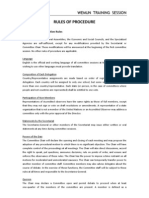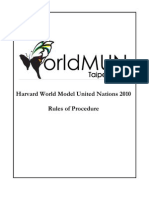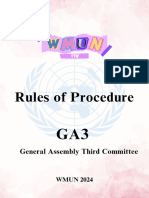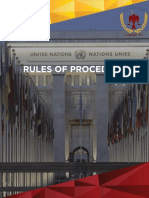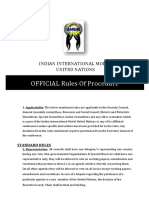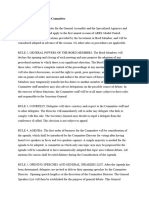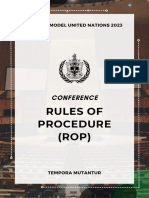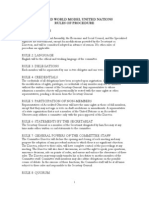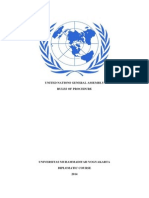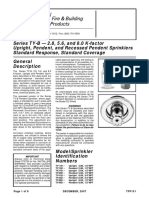Islamabad Model United Nations: Rules of Procedure
Islamabad Model United Nations: Rules of Procedure
Uploaded by
Hamza ButtCopyright:
Available Formats
Islamabad Model United Nations: Rules of Procedure
Islamabad Model United Nations: Rules of Procedure
Uploaded by
Hamza ButtOriginal Description:
Original Title
Copyright
Available Formats
Share this document
Did you find this document useful?
Is this content inappropriate?
Copyright:
Available Formats
Islamabad Model United Nations: Rules of Procedure
Islamabad Model United Nations: Rules of Procedure
Uploaded by
Hamza ButtCopyright:
Available Formats
Islamabad Model United Nations
Rules of Procedure
1 - GENERAL RULES 1.1Scope These rules shall apply to all regular sessions of Islamabad Model United Nations for all Committees. These rules are self-sufficient and no other rules shall apply. In situations not covered by the rules, the Chair shall constitute the final authority. 1.2 The Secretariat The Secretariat shall consist of the Secretary General, Committee Chairs, Vice Chairs and those persons the Secretary General has appointed to the Secretariat. The ruling of a Secretariat member on any rule or regulation herein is final and overrides any other ruling or appeal. Any rule may be altered, suspended or added by a member of the Secretariat at any time. The Secretary General or any member of the Secretariat may make verbal or written statements to a Committee/Council at any time during the conference. 1.3 Diplomatic Courtesy Delegates must accord diplomatic courtesy to all other Representatives and Secretariat members at all times, Representatives who persist in obvious attempts to disrupt the session shall be subject to expulsion from the Committee/Council by the Chair, The Secretariat reserves the right to expel any Representative/delegation from the conference, Decisions of the Chair on diplomatic courtesy are not appealable. 1.4 Dress Delegates are expected to dress in accordance with their role as UN diplomats. In other words, this means that gentlemen should wear, at minimum, shirt and tie, dress trousers and dress shoes. Ladies should also dress formally in business style suits, formal shalwar qameez or sari. Any form of dress which includes T-shirts, jeans, shorts, hats, athletic shoes or any form of
commercial advertising will not be considered appropriate. 1.5 Language The working language of the conference is English. All documents must be drawn up and speeches delivered in English. The only exceptions are the Pakistan National Assembly, the and the National Crisis Cell wherein delegates may deliver speeches in either Urdu or English. All documents must still be drawn in English. 2 THE CHAIRS 2.1 Composition Each committee shall have a Committee Chair and a Vice Committee Chair or two CoChairs as designated by the Secretariat except in the case of the Pakistan National Assembly which shall have a Speaker and a Deputy Speaker. Individually or collectively, these shall have the capacity to assume the office of the Chair. In the absence of the assigned Chair, an individual will be appointed by the Secretary General to perform the duties. 2.2 Duties The Chairs shall be responsible for maintaining the Speakers' List, recording the Roll Call at the beginning of each committee session, and recording the results of all votes in the committee. The Chair shall declare the opening and closing of each meeting, direct discussion, accord the right to speak, equitably and objectively recognize points and motions, put questions to a vote, announce decisions, ensure the observation of these rules, and rule on disputed points. The Chair is also primarily responsible for the substantive content of the committee proceedings. The Chair must authorize each draft resolutions for their introduction to the floor. 2.3 Powers After the Secretary General, the Chair shall be the final authority in each committee. The Chair may refuse to entertain any procedural motion at her/his discretion. At any time, the Chair may propose the adoption of a procedural motion without a vote by the committee. 3 DELEGATIONS 3.1 Composition Each delegation may have a maximum of one delegate each in eight to eleven of thirteen committees. In the General Assembly, Economic and Social Council, Security Council and the International Court of Justice, delegates from the same delegation will represent the country allotted to the team by IMUN. In the Pakistan National Assembly, the National Crisis Cell and Joint Crisis Committees delegates will represent political groups or figures allotted to the delegates by IMUN.
3.2 Censure Delegates are expected to know their countrys foreign policy or represented personalitys position. Delegates who clearly and persistently misrepresent their countrys foreign policy in speeches and substantive votes are subject to censure. 3.3 Censure Procedure The Committee Chair with the advice and consent of the Secretary General must preauthorize all motions for censure. Once the motion to censure is raised by a delegate and authorized by the Chair, the delegate in question is allowed two minutes to explain him/ herself and speak against the censure. The motion shall then be voted on. It requires a twothirds majority to pass. The effects of censure are as follows: First censure: The delegate is barred from the committee room for the remainder of the current committee session. Second censure: The delegate is barred from the committee room for the remainder of the conference. 3.4 Observer Status Delegations from non-member states or international agencies recognized as having Observer Status by IMUN shall be accorded all rights in the Committee except the following: They may not vote on any item, They may not make or second a motion to close debate on an issue or adjourn a session of the Committee. 4 - THE COMMITTEE 4.1 Roll Call At the beginning of each session the Chairs shall initiate roll call. Each delegate must respond either present or present and voting. Delegates who are present may vote in favor, opposed or abstain, subject to the rules on abstention. Delegates who are present and voting may only vote in favor or opposed; abstentions are not permitted. If a delegate is not present at the start of a session when the Roll Call is taken, then he/she may not vote in the session. 4.2 Quorum Before formal debate or voting procedure may begin, the committee must meet quorum. Quorum is defined as one-third of the voting members of a committee as determined by the roll call list. Any delegate may, at any time, request verification of quorum. The Chair will rule immediately on the motion, initiating roll call if he/she deems it necessary. Quorum is assumed to be met unless it is shown otherwise. 4.3 Majorities A simple majority is defined as more votes in favor than opposed (a motion fails on a tie vote). Any number of abstentions may not cause the motion to fail. A two-thirds majority
is defined as at least two votes in favor for each vote opposed (e.g. a vote of 8 in favor, 4 opposed, would pass regardless of the number of abstentions). Questions concerning the number of votes required to constitute a majority must be directed to the chair. 4.4 Procedural Voting For procedural matters, such as a vote on going into a caucus or closing debate, each delegation has the obligation to vote. Only votes of "yes" or "no" shall be in order. A motion for a Roll Call Vote on procedural matters is never in order. 5 DEBATE 5.1 Agenda The agenda refers to the order in which the committee shall discuss the topics. For committees that have more than one topic under consideration, the first order of business for the committee shall be the consideration of the agenda. Only topics on the provisional agenda pre-selected by the Secretariat shall be considered. The Chair shall open a primary speakers' list and entertain a motion to set the first topic on the agenda. In the event of such a motion, the Chair shall call for two speakers for and two speakers against. After all speakers have spoken, a vote shall be held and a simple majority shall be required for the motion to carry. If the motion carries, a secondary speakers' list shall be opened to discuss the first topic on the agenda. If the motion fails, or if there is no motion to set the first topic on the agenda, the Chair shall by-pass the primary speakers list and automatically open a secondary speakers list to discuss the second topic. In case there are more than two topics, the Chair shall entertain a motion to set the second topic on the agenda. 5.2 Speakers List Primary Speakers List: A primary speakers' list shall be established at first to set the agenda. This speakers' list shall consist of a maximum of four speakers for and four speakers against. Each speaker may speak for a maximum of two minutes unless stated otherwise by the Chair. For committees with only one topic, this shall be by-passed. Secondary Speakers' List: Once the first agenda topic is set, a secondary speakers' list that deals with the topic in question shall be opened. Each speaker on the secondary speakers list may speak for a maximum of two minutes unless stated otherwise by the Chair. General Policy: A member may add his or her name to the list, as long as it is not already on the list, by raising their placard. Debate is closed automatically upon exhaustion of the speakers' list. 5.3 Motion to Suspend Formal Debate and Caucus During the course of debate, a delegate may move to caucus. When making such a motion, the delegate must specify a type, time limit, reason and in case of a moderated caucus, an individual speaking time for the caucus. There are two types of caucus. They are as follows: Unmoderated caucus: The Chairs are not involved. Delegates may leave their seats,
leave the room, etc. to speak to each other in a less formal setting or to write draft resolutions. No points or motions shall be in order during unmoderated caucus. Moderated caucus: Delegates remain in their seats and raise their placards if they wish to speak. They are recognized at the Chairs discretion for a specified amount of time. During a moderated caucus, the Chair shall call to order delegates who are making speeches not relevant to the designated topic. No points or motions shall be in order during a moderated caucus except Points of Order, Points of Personal Privilege and Rights of Reply.
5.4 Motion to Close Debate A member may, at any time, move for closure of debate on substantive matters under discussion. The Chair may rule such a motion out of order. If the motion is ruled in order, the Chair may recognize up to two (2) speakers against this motion, but none in favor. This requires a two-thirds (2/3) majority to pass. If the motion passes, all draft resolutions and amendments are brought to an immediate vote. If the speakers' list is exhausted, debate is closed automatically and all draft resolutions and amendments on the floor are brought to an immediate vote. 5.5 Motion to Adjourn The effect of a motion to adjourn is to suspend the meeting of the committee until the next scheduled committee session. A motion to adjourn is in order only within the final 15 minutes of a committee session. The Chair may rule this motion out of order. The Chairs decision on this matter cannot be appealed. The motion to adjourn requires no debate and passes on a simple majority. 6 SPEECHES 6.1 Addressing the committee No member may address the committee without having obtained the permission of the Chair. The Chair may call a speaker to order if his or her remarks are not relevant to the subject matter under discussion. A speech may not be interrupted by another delegate, unless that delegate is rising on a Point of Personal Privilege or a Point of Order. 6.2 Time Limit on Speeches The standard individual speaking time limit on the secondary speakers list is two minutes. A member of the committee may move to change the time limit on speeches. Such a motion requires a simple majority to pass. The Chair may rule such a motion dilatory without appeal. Any motion to extend the time limit on speeches beyond three minutes is out of order. 6.3 Yields Each delegate must yield his/her time in one of the following four ways: To the Chair: The remaining speaking time is forfeited and the committee moves on.
To comments: Two delegates, selected by the Chair, may make 30 second comments on the speech just delivered. The content of comments must pertain solely to the preceding speech. The Chair shall call to order a speaker whose comment does not pertain solely to the preceding speech. To another delegate: The delegate speaking may designate another delegate to speak for the remainder of his/her speaking time. To questions: The delegate may use the rest of his/her time to answer questions posed by other delegates. The Chair shall select delegates to pose questions. Only the time taken to answer the questions shall be counted against the speakers remaining time. The time taken to pose the questions is not taken into account, although the Chair may cut off a delegate who takes too long to ask a question. Yields other than to the Chair shall be out of order while in the primary speakers list. A speaker who wishes to make a motion after speaking may do so after their speech but before yielding the floor. By making a motion the speaker yields the floor. 6.4 Right of Reply That Chair may accord a Right of Reply to any delegate upon request if a speech by any delegate contains unusual or extraordinary language clearly insulting to personal or national integrity. The insulted delegate has one minute to reply to the offensive comment. A right of reply to a right of reply is never in order. A right of reply is only in order immediately following the speech in which the delegate was insulted, and all decisions of the Chair relating to rights of reply are not subject to appeal. 7 - PROCEDURAL POINTS IN ORDER OF PRIORITY 7.1 Point of Personal Privilege A delegate may rise to a Point of Personal Privilege during the discussion of any matter when his or her ability to participate in the proceedings is in any way impaired. This includes a situation where a speaker is inaudible and the delegate cannot hear them. The Chair shall attempt to remove the cause of the impairment. This point may interrupt a speaker. 7.2 Point of Order A delegate may rise to a Point of Order to complain of improper parliamentary procedure. The Chair will immediately rule on the Point of Order. He or she shall rule out of order any points which he or she finds dilatory or improper; such a decision is not subject to appeal. A Point of Order may interrupt a speaker. The member rising to a Point of Order may not speak on the topic of discussion. 7.4 Point of Parliamentary Inquiry A delegate may rise to a Point of Parliamentary Inquiry in the case that he/she has a question for the Chairs regarding the rules of procedure. Points of Parliamentary Inquiry can neither interrupt a speaker nor be in regard to substantive matters.
8 - SUBSTANTIVE MATTERS WORKING PAPERS 8.1 Working Papers Working papers are informal documents used to communicate ideas with the entire committee. They usually involve identification of key issues to be addressed by the Committee and possible solutions proposed by delegates. They need not be in resolution format and need no sponsors or signatories. To be photocopied and distributed they require the authorization of the Chair, granted on the basis of the usefulness of the paper, clarity of expression, whether or not the idea is already understood by the committee and whether the paper substantially duplicates a working paper or draft resolution already on the floor. Working papers need not be introduced through a separate motion and are never voted upon. 9 - SUBSTANTIVE MATTERS DRAFT RESOLUTIONS 9.1 Definition of Draft Resolutions A draft resolution is a written proposal, submitted to and approved by the Chair, consisting of at least one perambulatory clause and one operative clause. The term resolution is to be used only in reference to documents already passed by that committee or other bodies. 9.2 Format Draft resolutions must be written in proper resolution format, as outlined in the IMUN Delegate Guidebook. Copying, distribution, and introduction of draft resolutions will occur upon approval of the draft resolution by the Chair. 9.3 Sponsors A minimum of two (2) member states must be designated as sponsors of a draft resolution in order for it to be approved by the Chair. Delegates sponsoring a draft resolution are obligated to vote in favor of the draft resolution. This obligation (to vote for) is waived upon the passage of one or more unfriendly amendments. Once a draft resolution has been introduced, delegates may not remove their sponsorship. Additional sponsors may be added to a draft resolution with the consent of all existing sponsors and upon approval of the Chair. 9.4 Signatories A draft resolution must have the signatures of a minimum of one-fifth (1/5) of the total members of the committee in order to be approved and introduced, with sponsors counted as signatories. Delegates may sign a draft resolution even though they do not support the document in question; signatories only wish to bring the draft resolution to debate. Once a draft resolution has been introduced, delegates may not remove their signatures, and no further delegates may sign the draft resolution.
9.5 Introduction of a Draft Resolution A delegate may rise to move to introduce a draft resolution or amendment, upon its approval by the Chair and distribution to members of the body. Adoption of this motion shall be at the Chair's discretion. Sponsors will be invited by the Chair to read the draft resolution or amendment to the body. Introductions by a sponsor during a speech will be considered out of order. 9.6 Question and Answer Period Immediately following the introduction of a draft resolution, any delegate other than a sponsor may move for a question and answer period. When making the motion, the delegate shall specify a length and speaking time for the question and answer period. The motion passes on a simple majority. The Chair may accept or refuse this motion at his or her discretion. The decision of the Chair is not subject to appeal. Once the period has begun, delegates recognized randomly by the Chair may ask questions to the sponsors of the draft resolution. These questions must pertain only to the draft resolution and the Chair shall call to order any delegate who does not respect this rule. Once the question has been posed, one sponsor may respond to the question within the allotted speaking time. This pattern shall continue until the time allotted for the question and answer period has elapsed or no more delegates wish to ask questions. 10 - SUBSTANTIVE MATTERS AMENDMENTS AND WITHDRAWAL OF DOCUMENTS 10.1 Definition of Amendments An amendment to a draft resolution is a written proposal that adds to, deletes from or revises the operative clauses of a draft resolution. Substantive amendments to preambulatory clauses are never in order. 10.2 Types of Amendments Non-substantive: Amendments to draft resolutions to correct errors in spelling or format are considered non-substantive and shall be incorporated as part of the original draft resolution without a vote. The Chair will make final decisions on non-substantive amendments. Friendly: Substantive amendments approved by all sponsors of the draft resolution and approved by the Chair are considered friendly and are added to the draft resolution without a vote. Friendly amendments may be further amended through the unfriendly amendment process. Unfriendly: Substantive amendments not receiving approval from all sponsors of the draft resolution are considered unfriendly and require signatures from one-fifth (1/5) of the total members of the committee and the approval of the Chair to be introduced. A speakers list with two speakers for and two speakers against is drawn up for debate on an unfriendly amendment. Once all four speakers have spoken, a vote is held with a simple majority required for the unfriendly amendment to pass. Amendments to unfriendly amendments are out of order.
10.3 Withdrawal of Documents Draft Resolutions and Friendly Amendments: A draft resolution or a friendly amendment may be withdrawn from the consideration of the committee if all the sponsors so desire. Unfriendly Amendments: An unfriendly amendment may be withdrawn from the consideration of the committee if all the sponsors of amendment so desire. 11 - VOTING 11.1 Voting Rights Each member delegation shall have one vote in each committee on which it is represented. No delegate may cast a vote on behalf of another country. 11.2 Voting Procedure Voting on draft resolutions or amendments, except where otherwise provided, shall occur by placard vote. Draft resolutions, except where otherwise provided, shall require a simple majority to pass and shall be voted upon as a whole. Once a secondary speakers List is exhausted or a motion for closure of debate is passed, the committee moves into voting procedure. During voting procedure no notepassing or caucusing is allowed. Once in voting procedure, when there are no points or motions on the floor, the Chair shall put the draft resolutions to a vote. There shall be no further debate. Once voting on draft resolutions has finished, the Chair shall declare the end of voting procedure, and the committee shall turn to the second topic on the agenda. If both topics are exhausted the Chair shall entertain a motion to adjourn.
You might also like
- 1677921294current GK January 2023Document52 pages1677921294current GK January 2023dhartiNo ratings yet
- Globalization and Nation-Building in The PhilippinesDocument41 pagesGlobalization and Nation-Building in The PhilippinesJustine SawilNo ratings yet
- Flow of Debate 1Document1 pageFlow of Debate 1Hamza ButtNo ratings yet
- Rules of Procedure of The Advisory PanelDocument8 pagesRules of Procedure of The Advisory Panelavipsita09No ratings yet
- UNA USA Rules of Procedures - Indraprastha MUN LibraryDocument5 pagesUNA USA Rules of Procedures - Indraprastha MUN Libraryayaan JindalNo ratings yet
- Rules of ProcedureDocument10 pagesRules of ProcedureAvi SharmaNo ratings yet
- Legacymun'24 RopDocument15 pagesLegacymun'24 Rop9tspk22nzzNo ratings yet
- VMUN 2024 Rules of ProcedureDocument16 pagesVMUN 2024 Rules of Procedureivan.zhangapfsdsNo ratings yet
- Rule of ProceduresDocument12 pagesRule of ProceduresWestra TanribaliNo ratings yet
- RoP ISBMUN 2011Document14 pagesRoP ISBMUN 2011canךNo ratings yet
- Rules of Procedure 2010Document13 pagesRules of Procedure 2010Delegación UCVWMUNNo ratings yet
- S Infinity MUN OrientationDocument22 pagesS Infinity MUN Orientationmrunmayi.kaleNo ratings yet
- Thaimun III Streamlined RulesDocument16 pagesThaimun III Streamlined Rulesapi-284419211No ratings yet
- MUN Rules of ProcedureDocument13 pagesMUN Rules of ProcedureMuabhiNo ratings yet
- Wego Mun Ga3 RopDocument13 pagesWego Mun Ga3 Ropywu664557No ratings yet
- Nac RopDocument12 pagesNac RopShafanMahfudzNo ratings yet
- Conference Preparation GuideDocument7 pagesConference Preparation GuideMeenakshi KaulNo ratings yet
- Rules of ProcedureDocument8 pagesRules of ProcedureAl Makosinski100% (1)
- MUN Rules and ProcedureDocument8 pagesMUN Rules and Proceduremaadhav.vivek08No ratings yet
- MAISMUN 2019 Delegate HandbookDocument17 pagesMAISMUN 2019 Delegate HandbookYash SaraogiNo ratings yet
- Chairing RulesDocument40 pagesChairing RulesrachitNo ratings yet
- Delegate Handbook - 1Document30 pagesDelegate Handbook - 1Biswaroop GangulyNo ratings yet
- 57a79cDocument4 pages57a79cicfai.debsocietyNo ratings yet
- Rulesof ProcedureDocument11 pagesRulesof Procedurebrigadeesh.kNo ratings yet
- Inter House MunDocument7 pagesInter House Munsetiasamarth0No ratings yet
- Parlamentary ProcedureDocument4 pagesParlamentary Procedureansofy354100% (1)
- Conference Preparation GuideDocument9 pagesConference Preparation Guideanonymousx100% (1)
- Transmun 2016 United States Senate Rule of ProceduresDocument10 pagesTransmun 2016 United States Senate Rule of Proceduresapi-258105279No ratings yet
- Lumun15 RopDocument33 pagesLumun15 RopIqra AhmedNo ratings yet
- Iimun RopDocument11 pagesIimun RopAmritansh Kashyap100% (1)
- Rop Una Usa DpsimunDocument8 pagesRop Una Usa DpsimunAadrika DeokatheNo ratings yet
- ProcedureDocument12 pagesProcedureLuis David Briceño PNo ratings yet
- Rules of Procedure: ScopeDocument9 pagesRules of Procedure: ScopeYashica PatilNo ratings yet
- ROP and Pos. PaperDocument22 pagesROP and Pos. PaperkomahiumyNo ratings yet
- Rop FaoDocument7 pagesRop FaoManan GandhiNo ratings yet
- Rules of ProcedureDocument21 pagesRules of Procedureavnishpatil443No ratings yet
- WorldMUN+Rules+of+ProcedureDocument13 pagesWorldMUN+Rules+of+Procedurekaka mbaikeNo ratings yet
- Model United NationsDocument19 pagesModel United NationslauribooNo ratings yet
- Rules of Procedure - IIT Indore MUN 7.0Document28 pagesRules of Procedure - IIT Indore MUN 7.0riya.navlaniNo ratings yet
- ROP (Rules of Procedures) - AYIMUN 12th EditionDocument22 pagesROP (Rules of Procedures) - AYIMUN 12th Edition063Bebi NabilaNo ratings yet
- Rules of Procedure Bbsmun 2023Document46 pagesRules of Procedure Bbsmun 2023Nelson OliverNo ratings yet
- Rules of ProcedureDocument11 pagesRules of ProcedurevjmunNo ratings yet
- About SpeechesDocument12 pagesAbout SpeechesJefferson Franco GallardoNo ratings yet
- Amity MunDocument8 pagesAmity MunAnkush JadaunNo ratings yet
- Delegate Handbook MUN 2.0Document13 pagesDelegate Handbook MUN 2.0VickyNo ratings yet
- The Delegate Handbook 241013 090847Document19 pagesThe Delegate Handbook 241013 090847joelgeorgejochan8No ratings yet
- Rules of procedure MUNDocument24 pagesRules of procedure MUNH.Aziz KayıhanNo ratings yet
- Rules of ProcedureDocument6 pagesRules of ProceduredenizserkanadabasNo ratings yet
- Процедурные правила - офлайн версия - англDocument12 pagesПроцедурные правила - офлайн версия - англAbdul Matin RahimiNo ratings yet
- Mun TSDocument26 pagesMun TSSudip BasakNo ratings yet
- SOCHUM Background GuideDocument31 pagesSOCHUM Background GuideasqazilkwNo ratings yet
- RMUN 2023 Rules of ProcedureDocument16 pagesRMUN 2023 Rules of Procedurecelest lohNo ratings yet
- Rules of Procedure - ICHB MUNDocument30 pagesRules of Procedure - ICHB MUNGemma CadoganNo ratings yet
- Harvard World Mun Rules of ProcedureDocument13 pagesHarvard World Mun Rules of ProcedureŞeyma OlgunNo ratings yet
- The Rules of MUNDocument9 pagesThe Rules of MUNapi-302761340No ratings yet
- RoP MuNDocument17 pagesRoP MuNkomahiumyNo ratings yet
- RumunrulesofprocedureDocument7 pagesRumunrulesofprocedureapi-230086495No ratings yet
- General Rules: Rule 1: ScopeDocument4 pagesGeneral Rules: Rule 1: ScopeUbair WaseemNo ratings yet
- Screenshot 2024-08-03 at 6.40.39 AMDocument11 pagesScreenshot 2024-08-03 at 6.40.39 AMblueblack.1729No ratings yet
- '23 HandbookDocument12 pages'23 HandbookTempestNo ratings yet
- Ropdoc 2016bd32a590dc9243a2Document12 pagesRopdoc 2016bd32a590dc9243a2shishir.saripalli22No ratings yet
- Summary of Henry M. Robert, Daniel H Honemann, Thomas J Balch, Daniel E. Seabold & Shmuel Gerber's Robert's Rules of OrderFrom EverandSummary of Henry M. Robert, Daniel H Honemann, Thomas J Balch, Daniel E. Seabold & Shmuel Gerber's Robert's Rules of OrderNo ratings yet
- Quick Guide to Conducting Better Business Meetings Using Robert's Rules of OrderFrom EverandQuick Guide to Conducting Better Business Meetings Using Robert's Rules of OrderNo ratings yet
- WWF Global Network Position DamsDocument6 pagesWWF Global Network Position DamsHamza ButtNo ratings yet
- LR Raw 2Document11 pagesLR Raw 2Hamza ButtNo ratings yet
- Socio Lecture 5Document15 pagesSocio Lecture 5Hamza ButtNo ratings yet
- Paper CC PetitionDocument1 pagePaper CC PetitionHamza ButtNo ratings yet
- Banta v. Equitable Bank, IncDocument2 pagesBanta v. Equitable Bank, IncJay jogsNo ratings yet
- NIE Chennai 17-01-2024Document22 pagesNIE Chennai 17-01-2024chocolateboytomNo ratings yet
- 14-Suspension of Payments & RehabilitationDocument28 pages14-Suspension of Payments & RehabilitationEuna GallardoNo ratings yet
- Law and ItDocument33 pagesLaw and ItFaaiz siddiquiNo ratings yet
- Understanding Fire Sprinkler LIFE SAFETY ZoningDocument8 pagesUnderstanding Fire Sprinkler LIFE SAFETY ZoningcashloverNo ratings yet
- Australian MCV.Document4 pagesAustralian MCV.Rhona EscobarNo ratings yet
- Source of Regular Input VATDocument1 pageSource of Regular Input VATMarie Tes LocsinNo ratings yet
- Act Course-SyllabusDocument9 pagesAct Course-SyllabusMicsjadeCastilloNo ratings yet
- People v. PagalDocument3 pagesPeople v. PagalrubyNo ratings yet
- MILS ASSIGNMENT (Complete) - 4Document19 pagesMILS ASSIGNMENT (Complete) - 4Izyan HamdanNo ratings yet
- Ling Khee Ming v. Ling Shew Kue at King Chai Yuen (2018) 1 LNS 1139Document15 pagesLing Khee Ming v. Ling Shew Kue at King Chai Yuen (2018) 1 LNS 1139Teddy BearNo ratings yet
- SR-PR 2451-2022 PC Comp Parts Print For WebDocument6 pagesSR-PR 2451-2022 PC Comp Parts Print For WebEmma SalesNo ratings yet
- Manual Guideline For SCMTRDocument7 pagesManual Guideline For SCMTRRaja Singh100% (2)
- Psalm 139Document2 pagesPsalm 139Heather BixlerNo ratings yet
- Land Law Al AmenDocument17 pagesLand Law Al AmenMonish NayakNo ratings yet
- Big Ideas For Little Kids Teaching Philosophy Through Children's Literature Thomas E. Wartenberg All Chapter Instant DownloadDocument34 pagesBig Ideas For Little Kids Teaching Philosophy Through Children's Literature Thomas E. Wartenberg All Chapter Instant Downloadihmamisau100% (4)
- Redcross and NaziDocument13 pagesRedcross and NaziboergleNo ratings yet
- Appointment LetterDocument6 pagesAppointment LetterNiteshFJainNo ratings yet
- Scale and Scope of Fisheries Crime in The CaribbeanDocument61 pagesScale and Scope of Fisheries Crime in The CaribbeanPeter A MurrayNo ratings yet
- Notice Inviting E-TenderDocument15 pagesNotice Inviting E-Tendersbsssindia11No ratings yet
- K 0 DDocument24 pagesK 0 DDevna MaheshwariNo ratings yet
- Social Issues in The PhilippinesDocument19 pagesSocial Issues in The PhilippinessihmdeanNo ratings yet
- Tyco Ty-B PDFDocument8 pagesTyco Ty-B PDFJorge ValenciaNo ratings yet
- José Rizal - Author of Graciano López Jaena - Publisher of Mariano Ponce and Marcelo H. Del Pilar - The Organization's SecretaryDocument8 pagesJosé Rizal - Author of Graciano López Jaena - Publisher of Mariano Ponce and Marcelo H. Del Pilar - The Organization's SecretaryNyzaNo ratings yet
- Blind Guardian - The Bard's SongDocument1 pageBlind Guardian - The Bard's SongXristosKaragNo ratings yet
- Speech of Introduction For Gen Benjamin Madrigal JR Afp 51ST CsafpDocument5 pagesSpeech of Introduction For Gen Benjamin Madrigal JR Afp 51ST CsafpJayrold Balageo MadarangNo ratings yet
- Math 10 - Q 4 - SLM - Module 4Document9 pagesMath 10 - Q 4 - SLM - Module 4Ailen CeniaNo ratings yet





